Alumna releases video of Journalism Department chair using racial slur in lecture
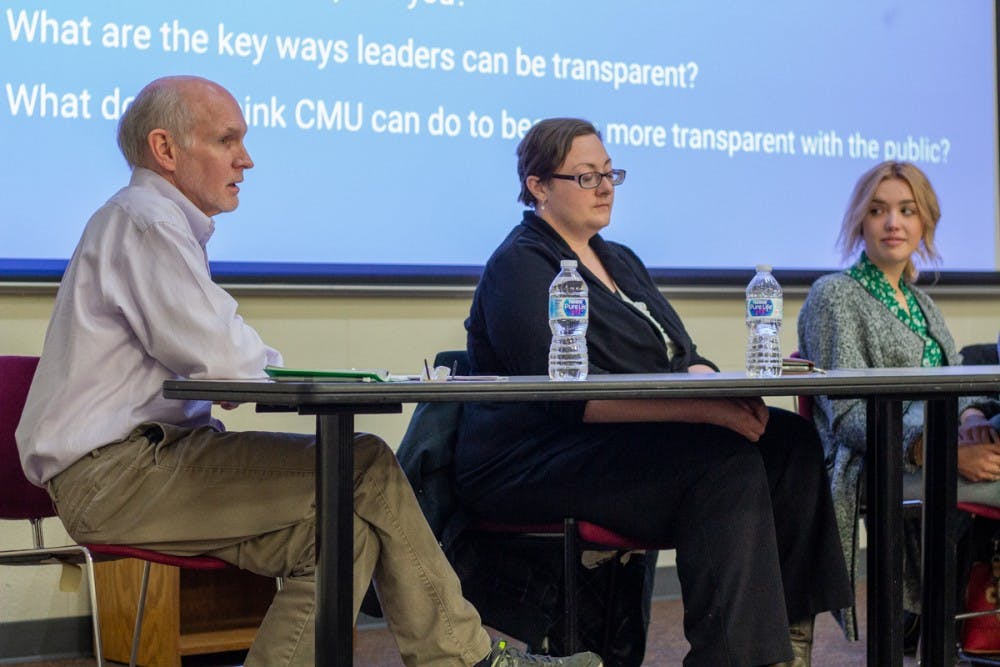
Professor Tim Boudreau speaks during a Society of Professional Journalists panel April 11 in Moore Hall.
After a video of him saying a racial slur during a class lecture about a 1993 lawsuit was posted on Instagram, Tim Boudreau, chair of Central Michigan University’s Journalism Department, has been put on paid administrative leave.
University officials will not comment on Boudreau's status with the university. Boudreau said he has been advised not to comment at this time.

“The university does not comment on active investigations or personnel matters,” said Ari Harris, Associate Director of Executive Communications at CMU.
In the nine-second video, Boudreau can be heard saying, “… so he said… ‘I don’t want you to be like n-----s in the classroom, but I want you to play like n-----s on the court’” during what appears to be a discussion about the 1993 lawsuit between CMU and fired men’s basketball coach Keith Dambrot. The words Boudreau was recorded saying during the lecture were the comments made by Dambrot to the team, not Boudreau's own words.
On June 22, alumna Skyler Mills, of Miami, Florida, posted a video on Instagram of Boudreau lecturing in his media law class. Mills' mother, Lisa, commented that the video was taken during her daughter's junior year. Mills graduated in 2019.
“Since we are exposing racists, let me introduce you to @cmuniversity professor Tim Boudreau who freely uses the n-word in class whether it be providing examples or quoting an individual,” Mills, an advertising major, captioned the post. “I know I wasn’t the only student of color who felt humiliated and uncomfortable by his racially insensitive statements.”
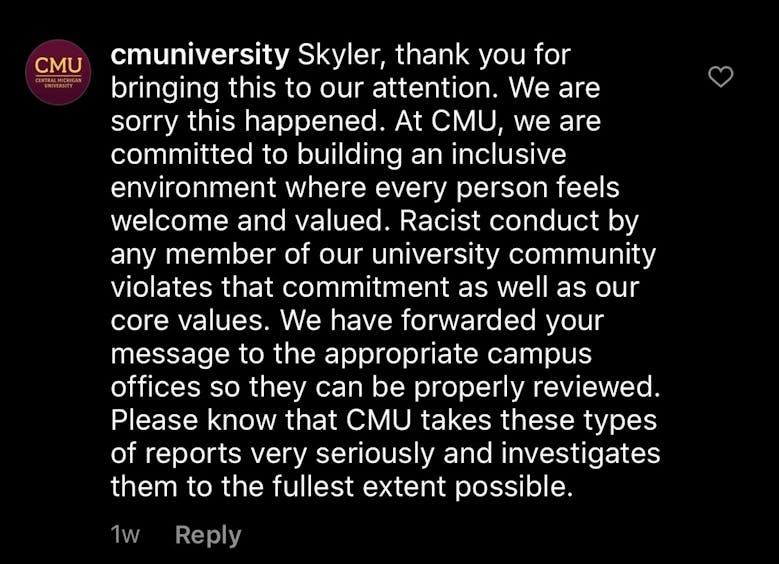
The university’s official Instagram account responded to Mills on June 24: “Skyler, thank you for bringing this to our attention. We are sorry this happened. At CMU we are committed to building an inclusive environment where every person feels welcome and valued. Racist conduct by any member of our university community violates that commitment as well as our core values. We have forwarded your message to the appropriate campus offices so they can be properly reviewed. Please know that CMU takes these types of reports seriously and investigates them to the fullest extent possible.”

On June 26, faculty received word that Boudreau had been placed on paid administrative leave. Boudreau was appointed chair of the Journalism Department in 2017. He also serves as faculty representative on the Student Media Department's board of directors which chooses Central Michigan Life's editor in chief each semester.
Faculty member Elina Erzikova will serve as temporary leader of the department.
“I am confirming officially that I am acting chair for a brief period of time,” Erzikova said in an email requesting comment.
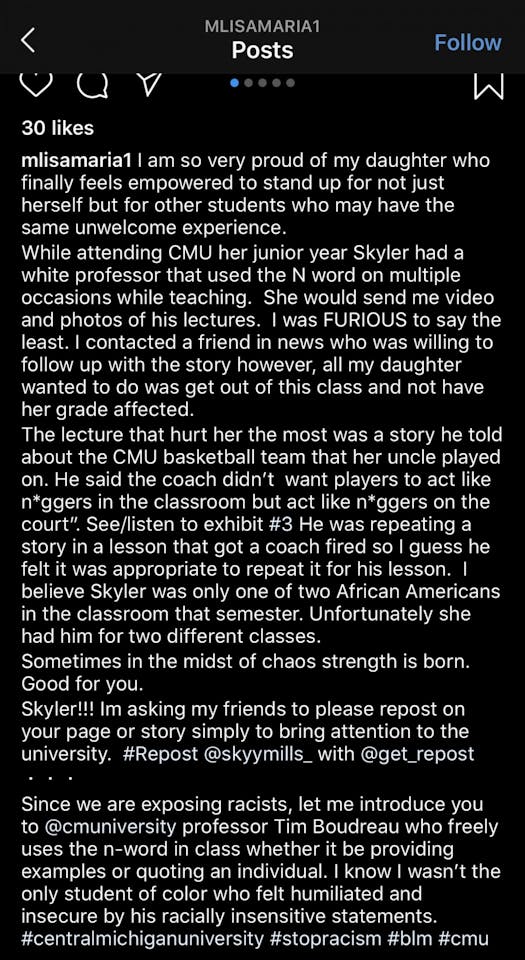
Both Mills and her mother were contacted for comment for this story. Lisa Mills sent a direct message to Central Michigan Life through Instagram stating, “Skyler was asked to hold off on any interviews until their investigation was over with."
Fenton senior Tess DeGayner said Boudreau gave a warning that he would be quoting racial slurs during a Feb. 19, 2020 lecture about the Dambrot lawsuit. Mills' brief video does not show Boudreau offering the same warning to that class.

“I remember Tim giving out a warning before he was about to read a statement that involved a former CMU basketball coach saying a racial slur,” said DeGayner, the president of the CMU Chapter of Society of Professional Journalists. “After that warning, someone sitting behind me had asked Tim not to say the slur, but to instead skip over the word. So he didn’t say it. But the statement from the former CMU coach was still up on the board.”
On Jan. 20 1993, after the men’s basketball team lost to Miami University (Ohio) Dambrot gave what he described as a “motivational speech" to the team. According to the Keith Dambrot v. Central Michigan University case brief, Dambrot prefaced his comments with “Do you mind if I use the N word?” Once he received some approval from members of the team, he continued with, “You know, we need to have more n-----s on our team.”
During the same basketball season, Dambrot told the players, “I don’t want you to be like n-----s in the classroom, but I want you to play like n-----s on the court” after a team practice in November 1992.
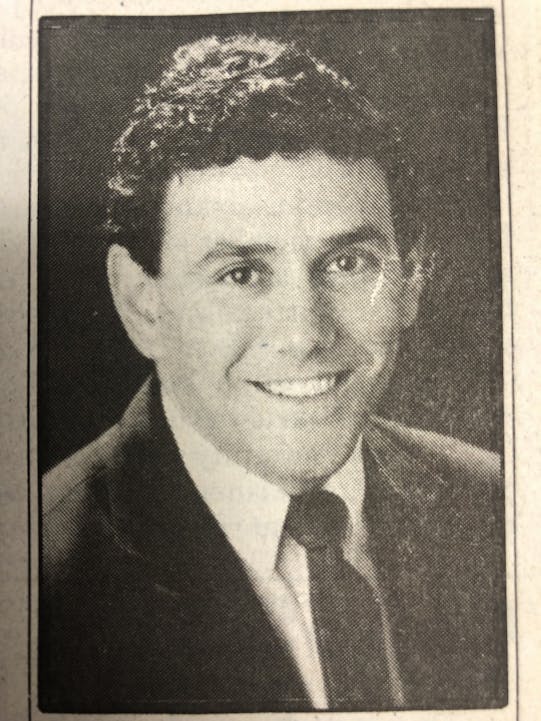
When asked by lawyers why he made those statements, Dambrot said, "Well, that's really a very easy question for me to answer, because we had had an incident early in the year where we had five or six basketball players, some of our bigger kids on our team, in a math class. And our kids were aggressive, tough, you know, a little bit loud, abrasive. And the lady was intimidated, because it was the first year that she ever had taught. And they almost got kicked out of the math class ... And it was my feeling that you can't be aggressive, tough, hard-nosed, abrasive in class, or you're going to get thrown out of classes, especially at a school like Central Michigan where the faculty members don't understand a lot about black people or have many black people in class. And I think our players understood what I meant by, 'Don't be n-----s in the classroom.'”
In February 1993, Dambrot requested that Athletic Director Dave Keilitz interview the basketball team about his comments. Following the interviews, Keilitz reported all of the “African-American” teammates he talked to “were not offended by the coach’s use of the term.”
The university's affirmative action officer, Angela Haddad, received a complaint about “Dambrot’s use of the N-word during the November incident” by former men's basketball player Shannon Norris. Haddad decided Dambrot’s use of the term was a violation of CMU’s discriminatory harassment policy and recommended that he be disciplined. Dambrot accepted a five-day suspension
In March 1993, fliers stating Dambrot’s use of n----r circulated on campus. One month later, Keilitz informed Dambrot that he would not be the coach for 1993-94 season stating he "was no longer capable of effectively leading the men's basketball program.”
Dambrot brought a lawsuit against the university in April 1993, claiming he was fired because he used the word "n----r" and the termination "violated his First Amendment right to free speech and academic freedom,” the case brief states. Several members of the basketball team joined the lawsuit alleging the university's discriminatory harassment policy was overbroad and vague and violated their First Amendment rights.
In 1995, Dambrot lost the case, but the United States District Court sided with the basketball players on account of being indirectly affected by his termination.
United States District Judge for the Western District of Michigan Judge Robert Holmes bell stated, “Dambrot's use of the N-word is even further away from the marketplace of ideas and the concept of academic freedom because his position as coach is somewhat different from that of the average classroom teacher. Unlike the classroom teacher whose primary role is to guide students through the discussion and debate of various viewpoints in a particular discipline, Dambrot's role as a coach is to train his student athletes how to win on the court. The plays and strategies are seldom up for debate. Execution of the coach's will is paramount. Moreover, the coach controls who plays and for how long, placing a disincentive on any debate with the coach's ideas which might have taken place.”
Boudreau’s "Law of Mass Communication" course focuses on the First Amendment and what speech is protected under it. The Dambrot v. CMU case is taught as a part of his “Hate Speech and Speech Codes at Universities” unit.
Boudreau also is known for inviting speakers to his class to challenge students' ideas about free speech. Most recently, in April 2018, the class hosted five members of the Westboro Baptist Church and a Satanist in a discussion about the First Amendment.
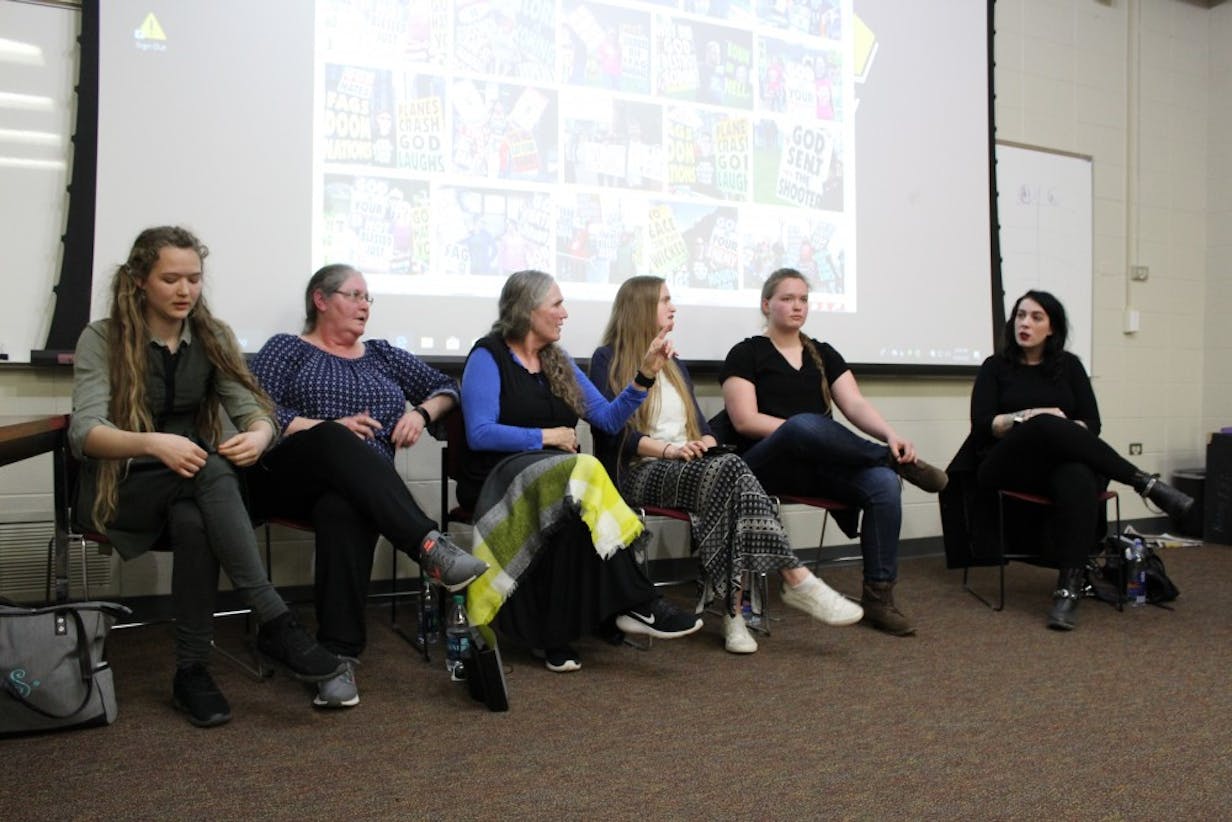
Members of the Westboro Baptist Church (left to right), Julia, Rebeccah, Shirley Phelps-Roper, Rebekah Phelps-Roper, , engage in debate with Satanist Jex Blackmore (far right). The discussion takes place in front of a crowd of journalism students in Moore Hall room 105 on Tuesday, April 24, 2018.
“The journalism professor has annually invited radical speakers to his classroom, including the Westboro Baptist Church in 2010 and 2012,” Central Michigan Life reporter Melissa Frick wrote in a April 25, 2018 story. “The purpose of these conversations is to demonstrate First Amendment issues and challenge students to explore the fringes of free speech, Boudreau said.”
On the day of the discussion, extra security measures were put into place for students entering the classroom and members of the press were not allowed to cover the event.
“College of Communications and Fine Arts Associate Dean Andrew Spencer checked student IDs at the door,” Frick wrote in the article. “Only students registered for Boudreau's class were allowed to attend the event. CMU administrators also banned media from covering the classroom discussion. Security and police were stationed at the main entrances of Moore Hall and escorted the speakers from classroom to classroom.”
In the article, it is mentioned that Boudreau said, “the U.S. Supreme Court advocates protection of the press, safeguarding robust, wide-open debate on matters of public interest.”
"I think that's what you're going to see here today," Boudreau is quoted saying to his class "Uninhibited debate and discussion on matters that I think are of interest to you, like gay rights, abortion, separation of church and state, hate speech (and) symbolic speech."
Today, Dambrot is head coach of Duquesne University's men's basketball team. He previously coached at St. Vincent-St. Mary High School in Akron, Ohio. During his final two years as coach there he mentored NBA star LeBron James. Before playing for Dambrot, James discussed the Central Michigan incident. In the book, "Shooting Stars," written by James and H.G. Bissinger, James stated that he did not believe that Dambrot was a racist.
"At least eight black players on the team subsequently said that Dambrot had always treated them fairly," James wrote in his book. "I believe them because I got to know Coach Dambrot as well as anybody and never did I see him act in anyway that was racist. It just wasn't in the man. Regardless of how he intended his remark, he deeply regretted it."






